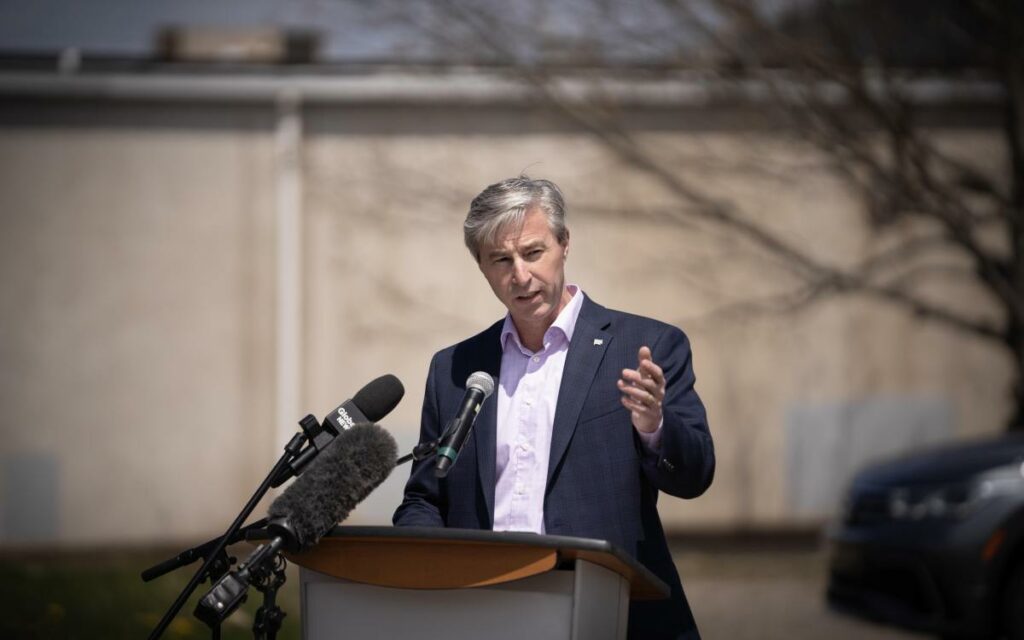
Nova Scotia Premier Tim Houston. In the span of just two years, Houston managed to increase government spending by a stunning 19 per cent. Photo credit: Twitter/Tim Houston
Nova Scotia Premier Tim Houston is slamming his foot on the gas pedal and driving the province toward a fiscal cliff. For the sake of future generations, Houston needs to hit the brakes and get government spending under control.
A few months before Houston led his Progressive Conservatives to victory in 2021, former premier Iain Rankin’s Liberal government tabled a budget with spending projected at $12.4 billion for the 2021-22 fiscal year.
This spring, Houston announced his government’s spending for 2023-24 would hit $14.8 billion.
In the span of just two years, Houston managed to increase government spending by a stunning 19 per cent. That’s eight percentage points higher than inflation over the same two-year period.
Since Houston entered the premier’s office, Nova Scotia’s debt has increased by $1.4 billion. At the same time, debt interest payments are up by $55 million a year. And Houston is spilling all this red ink even though revenue this year is expected to be $2.3 billion higher than in 2021.
By virtually any metric, Nova Scotia’s finances are in far worse shape than they were two years ago. And Houston appears to be just getting started.
In his government’s 2023 budget, Houston announced plans to run deficits as far as the eye can see. Over the next three years, Houston plans to run deficits as large as $610 million and add nearly $4 billion to the provincial debt.
Even three years from now, the province will be miles away from balancing the books if Houston doesn’t change course. In 2026-27, Houston expects Nova Scotia to be facing a deficit of $500 million.
How is Houston justifying piling billions of dollars of additional debt onto the backs of future generations of Nova Scotians?
“I’m comfortable running deficits in the short-term in order to make investments needed in health care,” Houston said last year.
Houston is misleading Nova Scotians.
First, these deficits aren’t short-term. Three years from now, Houston plans to run a deficit of half a billion dollars.
Second, all this new spending is not constrained to the health sector.
Yes, health-care spending is up from $4.1 billion two years ago to $4.9 billion today. But that only accounts for $800 million of the new spending.
If Houston were telling Nova Scotians the truth, he’d admit spending is up in every ministry and the province’s finances are spiralling out of control.
He would tell taxpayers that Nova Scotia will spend more than $800 million on debt interest charges this year. That’s nearly enough to pay for a brand-new hospital every year.
Instead, Houston is selling a fairy tale. He’s blaming all this new debt on health-care costs while most of his government’s new spending has nothing to do with health care.
While Nova Scotia is heading in the wrong direction, it’s not too late for the government to stop its debt dive. If Houston froze overall government spending for the next three years, he would be able to table a balanced budget in 2026.
A spending freeze wouldn’t have to apply equally everywhere. Houston could continue to increase the province’s health-care budget if he finds savings in other areas.
The bottom line is that Houston needs to get spending under control. Nova Scotia taxpayers don’t want to waste billions of dollars on debt interest and leave future generations with a fiscal trainwreck just because the province’s present government refuses to make tough choices.
After two years of massive spending increases, it’s time for the Houston government to buckle down, find savings and get Nova Scotia back on a sustainable course.

Jay Goldberg is the Ontario Director at the Canadian Taxpayers Federation. He previously served as a policy fellow at the Munk School of Public Policy and Global Affairs. Jay holds a Ph.D. in Political Science from the University of Toronto.






